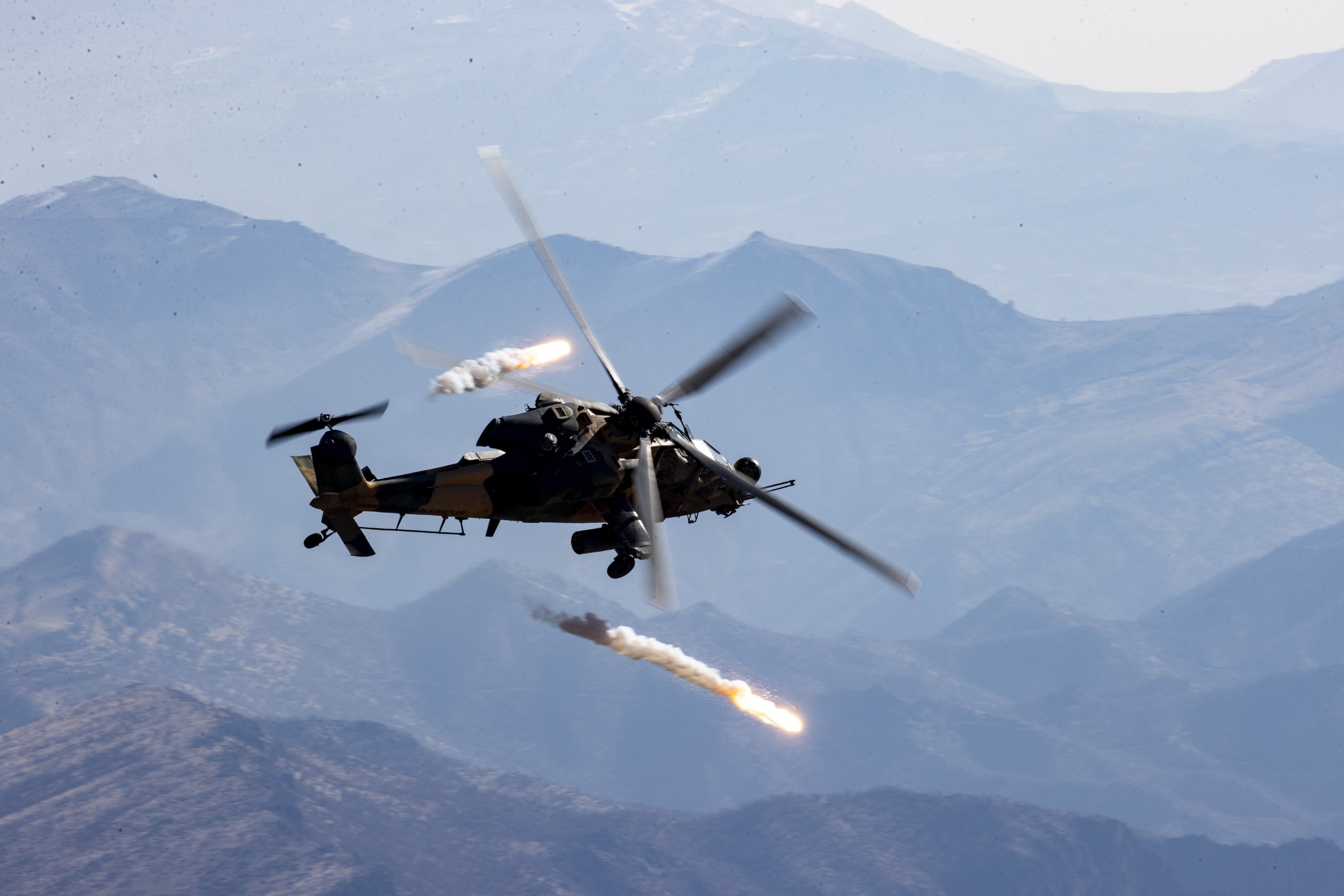© Turkuvaz Haberleşme ve Yayıncılık 2026
Operation Claw-Lock, the latest in a counterterrorism campaign by Türkiye, managed to eliminate a large number of terrorists from the PKK, authorities said. Since the cross-border operation started in April 2022, Türkiye stopped a total of 506 terrorists in northern Iraq, the National Defense Ministry announced, as it gave a tour of the counterterrorism operation area to a group of journalists across the Turkish border into Iraq.

Reporters saw terrorist elements being hit from the borderline from a hill at an altitude of approximately 2,050 meters (6,726 feet). In addition, reporters were told that 575 terrorist caves, bunkers and shelters had been destroyed, and over 2,000 mines/handmade explosives, 1,182 weapons and nearly 540,000 pieces of ammunition were seized.
Türkiye launched Operation Claw-Lock last April to target the PKK terrorist group's hideouts in the Metina, Zap and Avasin-Basyan regions of northern Iraq, near the Turkish border. Two operations preceded it – Claw-Tiger and Claw-Eagle – launched in 2020 to root out terrorists hiding north of Iraq and plotting cross-border attacks in Türkiye.
The Turkish army aims to cut off supplies and the operational area for the terrorist group, whose leadership hides in the Qandil Mountains in northern Iraq. Turkish airstrikes have frequently hit the Qandil area in the last decades, yet, ground operations have been scarce due to immediate security risks.
Qandil became the PKK's main headquarters in the 1990s after it used the Bekaa Valley of Lebanon as training grounds for many years. The first extensive operation against the PKK was carried out in May 1983, when 5,000 Turkish soldiers crossed the Iraq border and advanced 5 kilometers (3.11 miles). After a land operation in the Qandil Mountains to destroy PKK hideouts, they retreated. In the mid-1990s, the operations intensified due to increased PKK attacks and infiltration attempts near border towns that cost hundreds of Turkish soldiers' lives. In May 1995, the Turkish army launched Operation Steel with the participation of 35,000 personnel. The operation was followed by Operation Claw, launched on May 27, 2019, to eliminate the presence of the terrorist organization in northern Iraq.
Authorities say the operation "locked out" terrorists who threatened Turkish territories. Col. Ercan Şen, deputy commander of the 2nd Border Brigade, told reporters that Türkiye faced more than 900 harassment, fire and sabotage attempts before the operations from the northern Iraqi side. "But with our operation, commandos entered into dens of terrorists and destroyed them. They secured the area," he said. Şen said the operation essentially stopped the infiltration of terrorists into Türkiye. The PKK uses rugged terrain that is hard to secure in its entirety.
The Turkish army maintains several outposts across the border and in Iraq's north in line with its self-defense rights under United Nations regulations against terrorism. Challenged by terrain and worsening weather conditions in the region, known for its harsh winters, soldiers are aided by their resolve and modern reconnaissance systems and domestically made weapons.
Uncrewed aerial vehicles, both armed and unarmed, and uncrewed combat aerial vehicles are also of great assistance to the soldiers. Throughout Operation Claw-Lock, they recorded about 15,000 hours of flight.
Şen said the operation has been tremendously successful so far, giving the example of what terrorists called "Hell Hill" (Meluni Mountain), "a place terrorists considered completely inaccessible" to troops due to its rough terrain. "There, 47 caves and similar shelters harboring terrorists were detected, and 13 were 'neutralized' on the hill. Two others turned themselves in," he said.
Turkish army uses the word "neutralizing" when describing terrorists killed, wounded or captured alive. "Eventually, we reached every point they deemed inaccessible," he said.
Authorities also showed the journalists a field hospital set up with the support of the Health Ministry to provide first aid to soldiers wounded in operations. Skilled physicians and modern medical equipment staff the hospital for vital first aid for wounded soldiers who are later transported to hospitals in the cities.
